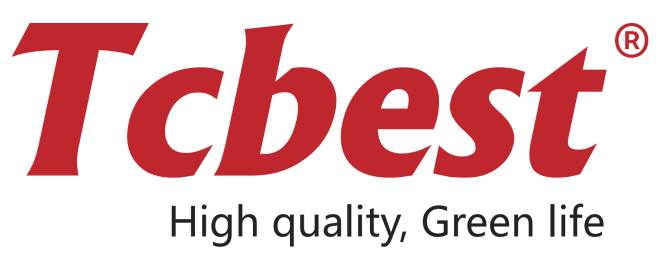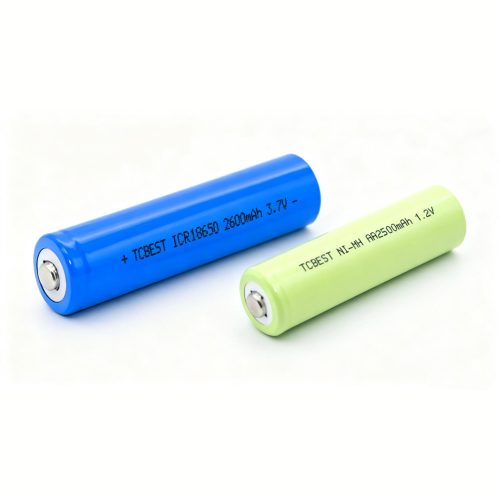Choosing between lithium-ion and NiMH batteries is a decision that directly impacts device performance, reliability, and overall cost. Both of these rechargeable battery types are widely used in the market, but their design goals and applications differ greatly. When comparing lithium-ion batteries with NiMH, the differences are most evident in areas such as voltage, cycle life, energy density, and self-discharge rate. As a globally trusted battery supplier, Tcbest provides both solutions to meet needs ranging from consumer electronics to large-scale energy storage.
What Is a NiMH Battery?
Chemistry and Structure
NiMH batteries use nickel oxide hydroxide as the cathode and a hydrogen-absorbing alloy as the anode. This design was developed as an upgrade from the older nickel-cadmium batteries, eliminating toxic cadmium while improving capacity, safety, and environmental friendliness.
Advantages
The main advantages of NiMH batteries are affordability and safety. They can withstand frequent charging and even occasional overcharging while remaining stable. In addition, NiMH batteries are easier to recycle, making them more environmentally friendly. For this reason, they are widely used in everyday electronic products.
Limitations
However, NiMH batteries also have some drawbacks. Their self-discharge rate is relatively high, reaching up to 30% per month, which means they can lose power quickly even when not in use. Their lifespan is shorter as well, averaging around 500 cycles. NiMH batteries are also larger and heavier than lithium-ion, making them less suitable for compact or high-performance devices.
Common Applications
NiMH batteries are commonly found in rechargeable AA/AAA packs, remote controls, cordless phones, cameras, and certain early hybrid vehicles. They remain a good option for applications where high energy density and compact size are not the primary requirements.

What Is a Lithium-Ion (Li-ion) Battery?
How It Works
Lithium-ion batteries operate by moving lithium ions between electrodes during charging and discharging. This mechanism provides higher energy density and better efficiency, making Li-ion the preferred choice for modern portable devices.
Advantages
Lithium-ion batteries deliver higher voltage per cell, usually 3.6–3.7 volts, while being compact and lightweight. Their self-discharge rate is extremely low, typically only 1–3% per month, which ensures excellent reliability during long-term storage. They also last much longer, often exceeding 1,000 cycles, making them more cost-effective in the long run.
Limitations
The disadvantages of lithium-ion include higher cost and greater sensitivity to heat, physical damage, and overcharging. To ensure safe operation, they must be paired with a Battery Management System (BMS) that monitors voltage and temperature. Despite these requirements, their performance advantages make them indispensable in high-demand applications.
Common Applications
Today, lithium-ion batteries are the standard power source for smartphones, laptops, drones, and electric vehicles. They are also widely used in solar energy storage systems and portable power stations. Tcbest additionally provides customized Li-ion battery packs designed for professional and industrial needs where safety and reliability are critical.

Key Differences Between Lithium-Ion and NiMH Batteries
The differences between lithium-ion and NiMH batteries are clear in terms of voltage, lifespan, and overall efficiency. Lithium-ion delivers higher voltage, longer cycle life, and lower self-discharge, making it ideal for lightweight and long-lasting power in modern devices. NiMH, although more affordable, loses energy more quickly and is bulkier, making it better suited to low-performance applications. Ultimately, the choice comes down to balancing cost and performance.
Pros and Cons Summary
Lithium-ion batteries are praised for their long lifespan, high efficiency, and compact design, but they require careful protection and higher upfront cost. NiMH batteries are valued for being safe, environmentally friendly, and inexpensive, but their shorter lifespan, higher self-discharge, and heavier build limit their use. Both play important roles in the market depending on application needs.
Which Battery Should You Choose?
If your priority is affordability and safety, NiMH batteries remain an excellent choice for everyday, low-drain devices such as household electronics and certain hybrid vehicles. If you need lightweight, durable, and high-performance power, lithium-ion is the superior choice, especially for smartphones, renewable energy systems, and electric vehicles. The greatest advantage of working with Tcbest is our ability to provide customized battery packs designed to meet exact requirements for voltage, capacity, and size. Whether you need NiMH for basic applications or Li-ion for advanced solutions, Tcbest delivers stable and reliable energy solutions tailored to your needs.
FAQ
Which battery has a longer lifespan, lithium-ion or NiMH?
Lithium-ion batteries usually last for more than 1,000 cycles, while NiMH batteries average around 500 cycles. If you need long-term durability, lithium-ion is the better choice.
Can NiMH batteries replace lithium-ion batteries?
In some low-power devices, NiMH batteries can be used as alternatives. However, for high-performance applications like smartphones, EVs, or energy storage systems, lithium-ion remains the best option.
Which battery is safer?
NiMH batteries are generally more stable and less sensitive to overcharging or temperature fluctuations, making them suitable for household use. Lithium-ion batteries are more powerful but require a BMS for safe operation.
Which battery is better for long-term storage?
Lithium-ion batteries are better for long-term storage, with a self-discharge rate of just 1–3% per month. NiMH batteries can lose up to 30% of their charge in a single month.
Does Tcbest provide customized battery solutions?
Yes, Tcbest specializes in providing custom battery packs tailored to specific device requirements. Whether you need NiMH or lithium-ion, Tcbest offers reliable solutions with the right voltage, capacity, and form factor.

